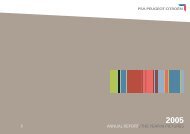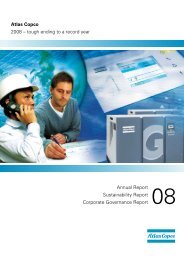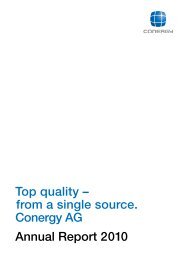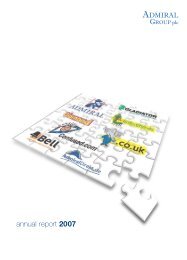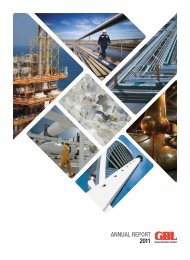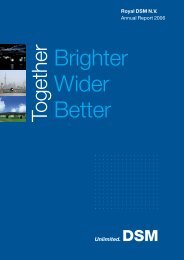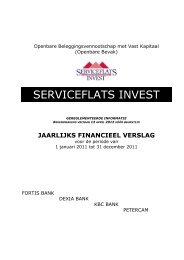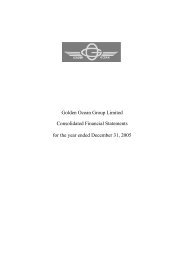BOC Report and accounts 2005 - Alle jaarverslagen
BOC Report and accounts 2005 - Alle jaarverslagen
BOC Report and accounts 2005 - Alle jaarverslagen
Create successful ePaper yourself
Turn your PDF publications into a flip-book with our unique Google optimized e-Paper software.
Operating review (comparing <strong>2005</strong> with 2004) 45<br />
Turnover was lower in <strong>2005</strong> as a result of the disposal of <strong>BOC</strong>’s packaged gas business in the US in July 2004 <strong>and</strong><br />
the disposal of part of the Unique Gas business in Thail<strong>and</strong> in December 2004.These disposals accounted for a<br />
ten per cent decrease in turnover for <strong>2005</strong> compared with 2004.The effect of disposals on turnover was partly<br />
offset by growth in Europe,Africa <strong>and</strong> the south Pacific region.<br />
The elimination of overhead costs following the US packaged gas disposal helped towards an increase in<br />
operating profit.This together with new business won was reflected in a £15 million increase in north American<br />
adjusted operating profit in <strong>2005</strong>. Other factors supporting profitability were the extension of ‘best commercial<br />
practice’ <strong>and</strong> ‘best operating practice’ business efficiency programmes to more parts of the world.<br />
Further progress was made with the refurbishment of retail stores - particularly in South Africa <strong>and</strong> Australia -<br />
during <strong>2005</strong> <strong>and</strong> this led to increased sales. Retail outlets also supported the growth of <strong>BOC</strong>’s safety products<br />
business.At the same time further comprehensive safety product contracts were won with major customers.<br />
New user-friendly product packages, including lightweight cylinders for emergency services, continued to drive<br />
sales growth of medical gases.Turnover of medical gases for <strong>BOC</strong>’s major subsidiaries, joint ventures <strong>and</strong> associates<br />
(excluding Japan) increased by seven per cent in <strong>2005</strong>.There was also good growth in the special products <strong>and</strong><br />
services business, which includes scientific gases, refrigerant gases <strong>and</strong> other packaged chemicals. Special gases<br />
turnover increased by 11 per cent in <strong>2005</strong> on the same basis.<br />
Higher petroleum prices in <strong>2005</strong> presented a challenge to margins in the liquefied petroleum gas businesses in<br />
Australia <strong>and</strong> South Africa but most of the cost increases were recovered in higher selling prices.<br />
Dem<strong>and</strong> for helium remained strong worldwide, driven by increasing use of medical imaging. New helium<br />
capacity is expected to come into production in Qatar in 2006.This will make more product available to <strong>BOC</strong> but<br />
at a higher price than existing supplies.<br />
There were no operating exceptional items in <strong>2005</strong>. Operating exceptional items in 2004 were for the<br />
integration of the industrial <strong>and</strong> medical gases businesses of <strong>BOC</strong> <strong>and</strong> Air Liquide in Japan that began in 2003, as<br />
well as for the restructuring of the ISP business in the US following the disposal of the packaged gas business.<br />
Europe Increased turnover reflected growing sales of medical <strong>and</strong> special products in the UK <strong>and</strong> generally<br />
favourable business trends in Pol<strong>and</strong>.The UK industrial market remained flat, but <strong>BOC</strong>’s business was exp<strong>and</strong>ed by<br />
increased sales of welding products. Increased energy costs were recovered by increased selling prices.<br />
Growth in the medical gases business was once again driven by the introduction of new lightweight cylinder<br />
packages <strong>and</strong> by winning hospital facilities management contracts.<br />
Increased turnover of special products was based largely on growing sales of gas mixtures for scientific<br />
applications <strong>and</strong> additional helium business. New capacity is being added to satisfy additional requirements for<br />
Siemens Magnet Technology (formerly Oxford Magnet Technology) the leading MRI scanner manufacturer. <strong>BOC</strong><br />
already manages Siemens’ helium requirements during manufacturing <strong>and</strong> will now provide on-site services for<br />
Siemens magnets in hospitals.Additional sales also resulted from the acquisition of Calor’s aerosol propellants <strong>and</strong><br />
hydrocarbon refrigerants business in the UK.<br />
Growth of <strong>BOC</strong>’s Sureflow hospitality gas <strong>and</strong> cellar services business was curtailed by lower sales of draught<br />
beer in the UK during <strong>2005</strong>.Additional business was gained in Irel<strong>and</strong> by providing cellar services for a major<br />
brewery chain.<br />
Changes in the provision of domiciliary oxygen in Engl<strong>and</strong> <strong>and</strong> Wales were announced by the National Health<br />
Service in <strong>2005</strong>. <strong>BOC</strong> was awarded one of the 11 regional contracts <strong>and</strong> from February 2006 will supply all forms<br />
of domiciliary oxygen to patients for the Eastern region. It is expected that this will lead to a reduction of <strong>BOC</strong>’s<br />
home oxygen sales in the UK over the next two years. However, the majority of <strong>BOC</strong>’s UK medical gases business<br />
is with hospitals <strong>and</strong> the emergency services, which is unaffected by this change.<br />
The AmericasThe disposal of <strong>BOC</strong>’s US packaged gas business was completed on 30 July 2004 when initial cash<br />
proceeds of US$175 million were received.This business had turnover of approximately US$240 million in 2003.<br />
The ISP business in the US now consists of bulk medical gases, bulk supplies to distributors, tube trailer <strong>and</strong><br />
liquefied helium. <strong>BOC</strong>’s US overhead costs were reduced following the disposal, as the business was then<br />
concentrated on a much smaller number of customers.As a result the US business became profitable in <strong>2005</strong>.<br />
During <strong>2005</strong>, new distributor channels were added, new helium business was secured in the US <strong>and</strong> new bulk<br />
industrial contracts were won with biotechnology <strong>and</strong> laser welding customers.<br />
Buoyant conditions in the oil <strong>and</strong> gas industry helped towards an improved performance in Canada<br />
during <strong>2005</strong>.<br />
<strong>BOC</strong>’s global helium business grew strongly in <strong>2005</strong> with increasing dem<strong>and</strong> in China <strong>and</strong> Korea. During 2006<br />
the first supplies from a new source in Qatar will enable these markets to be served more efficiently. However the<br />
financial impact is expected to be negative initially as additional volumes will be offset by higher feedstock costs.<br />
Growth in Latin America was driven by increased sales in Venezuela <strong>and</strong> Colombia, where the medical sector<br />
is the most important. However there was also growth in the industrial markets served by <strong>BOC</strong>’s associated<br />
company based in Chile.<br />
Africa Lower interest rates continued to stimulate South African domestic consumption <strong>and</strong> manufacturing output<br />
during <strong>2005</strong>, leading to better turnover for the African region. Operating profit also increased but by somewhat less<br />
than turnover, which was additionally inflated by higher liquefied petroleum gas (LPG) prices.<br />
Turnover grew in every part of the South African business but was led by particularly strong sales of safety<br />
products. During <strong>2005</strong> Afrox Safety was launched as a business br<strong>and</strong> <strong>and</strong> an on-site safety services business was<br />
acquired. Sales of scientific gases increased but from a relatively low base.<br />
Despite the challenge of a strong South African r<strong>and</strong>, export business also grew considerably. Plans are in<br />
place to exp<strong>and</strong> production of welding products for local use <strong>and</strong> particularly for export.<br />
Other African countries also produced satisfactory results with particularly good performances in Kenya<br />
<strong>and</strong> Zambia.



